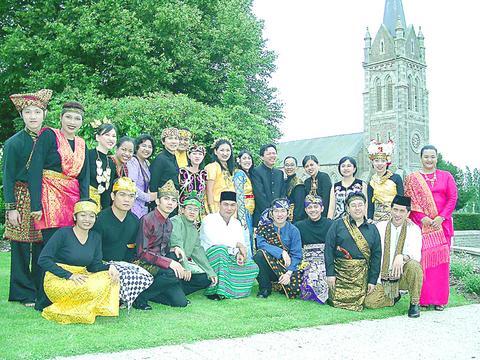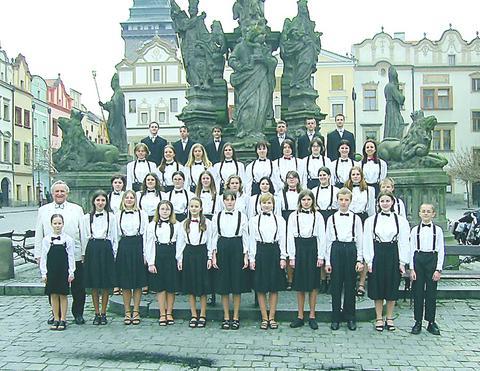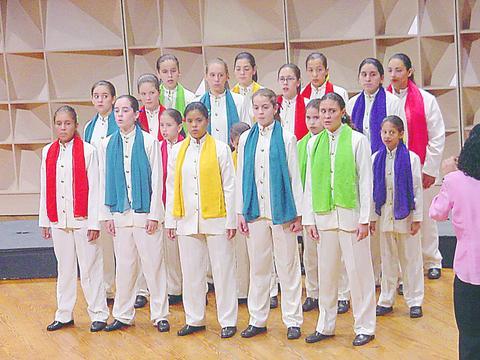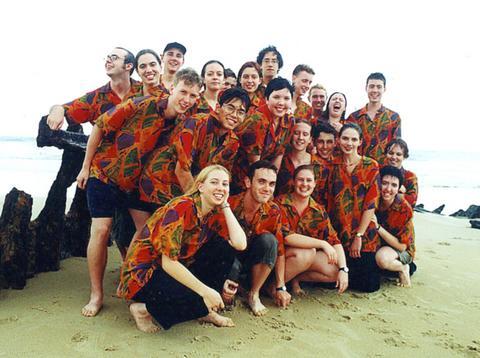The biennial Taipei International Choral Festival (
Six prestigious international choirs will be attending and these include: Nordic Voices from Norway, Australian Voices from Australia, Incheon City Chorale from South Korea, the Batavia Madrigal Singers from Indonesia, Iuventus Cantans from Czech Republic, and Aequalis Aurea from Venezuela. Also performing are 20 local choirs.
"This year we have a strong line-up of choirs that will have been rarely seen in similar choral events in Taiwan," said Dirk Du Hei (

PHOTO COURTESY OF TAIPEI PHILHARMONIC FOUNDATION OF CULTURE AND
"We promise to offer an exhilarating celebration of choral art," Du said.
The Final Gala Concert will feature Leonard Bernstein's Chichester Psalms and will be performed by the six international groups as well as the Taipei Philharmonic Chorus (
Prior to the concerts, there is a special film screening of the French movie Les Choristes to mark the opening of the festival. The screening will take place next Friday at Spring Cinema. The film can be seen as a French version of Dead Poets Society but the teacher influences the students with choral skills instead of reading old poems.

PHOTO COURTESY OF TAIPEI PHILHARMONIC FOUNDATION OF CULTURE AND
Apart from the concerts, there are also choral music camp and conducting workshop. Alberto Grau, Denes Szabo and Serene Liang (
There are also free "Afternoon Concerts," to be held at Songjiang Garden, National Taiwan University Hospital and Shinkong Mitsukoshi Department Store in the Xinyi district, where you can have a cup of tea and chat a little while enjoying the singing.
The Batavia Madrigal Singers from Indonesia won three awards in the international choir competition Florilege Vocal de Tours, France. It was the champion in the "Free Program" category, won third prize in "Vocal Ensemble" and received a special award from the French minister of culture for the "Best Interpretation of a French Composition."

PHOTO COURTESY OF TAIPEI PHILHARMONIC FOUNDATION OF CULTURE AND
Australian Voices is led by leading composer and conductor Stephen Leek. In 1996, the group was selected to represent Australia in the "Concert For Peace" in war-torn Bosnia-Herzegovina, sharing the stage with Jose Carreras before an audience of the world's royalty. The troupe's major accolades include the 1998 Bela Bartok International Choral Competition in Hungary. It was also a multiple major prize-winner at the 2001 International Choral Eisteddfod in Llangollen, Wales.
The Pardubice Children Choir Iuventus Cantans from the Czech Republic was founded in 1960 by Vlastislav Novak who has been conductor and artistic director since its foundation. In 2000, the group won two silver medals at the first World Choir Olympic organized in Linz, Austria, with the participation of 360 choirs from all over the world. Although it's a choir with classic training and a long history, its repertoire ranges from Czech folk songs, to the Beatles and Michael Jackson.
Aequalis Aurea from Venezuela was formed by combining two choirs: Aequalis and Voces Prisma, both founded by Venezualan conductor Ana Maria Raga.

PHOTO COURTESY OF TAIPEI PHILHARMONIC FOUNDATION OF CULTURE AND
Nordic Voices from Norway is a six-voice a cappella ensemble. Each member was educated at the State Academy of Music in Oslo and the National Academy of Operatic Art in Oslo, where they specialized in opera, composition, church music and conducting. In addition to its classical and romantic repertoire, the group is known for championing 20th century modern music.
The Incheon City Chorale from South Korea is led by professor Yoon Hak-woon, the pioneer of Korean choir history. In 1997, the group was invited to the Namur World Choral Festival to celebrate the 15th anniversary of the international Federation of Choral Music and to Europa Cantat in Linz, Austria, in which the group's performance was called "the finest performance."

This is the year that the demographic crisis will begin to impact people’s lives. This will create pressures on treatment and hiring of foreigners. Regardless of whatever technological breakthroughs happen, the real value will come from digesting and productively applying existing technologies in new and creative ways. INTRODUCING BASIC SERVICES BREAKDOWNS At some point soon, we will begin to witness a breakdown in basic services. Initially, it will be limited and sporadic, but the frequency and newsworthiness of the incidents will only continue to accelerate dramatically in the coming years. Here in central Taiwan, many basic services are severely understaffed, and

Jan. 5 to Jan. 11 Of the more than 3,000km of sugar railway that once criss-crossed central and southern Taiwan, just 16.1km remain in operation today. By the time Dafydd Fell began photographing the network in earnest in 1994, it was already well past its heyday. The system had been significantly cut back, leaving behind abandoned stations, rusting rolling stock and crumbling facilities. This reduction continued during the five years of his documentation, adding urgency to his task. As passenger services had already ceased by then, Fell had to wait for the sugarcane harvest season each year, which typically ran from

It is a soulful folk song, filled with feeling and history: A love-stricken young man tells God about his hopes and dreams of happiness. Generations of Uighurs, the Turkic ethnic minority in China’s Xinjiang region, have played it at parties and weddings. But today, if they download it, play it or share it online, they risk ending up in prison. Besh pede, a popular Uighur folk ballad, is among dozens of Uighur-language songs that have been deemed “problematic” by Xinjiang authorities, according to a recording of a meeting held by police and other local officials in the historic city of Kashgar in

It’s a good thing that 2025 is over. Yes, I fully expect we will look back on the year with nostalgia, once we have experienced this year and 2027. Traditionally at New Years much discourse is devoted to discussing what happened the previous year. Let’s have a look at what didn’t happen. Many bad things did not happen. The People’s Republic of China (PRC) did not attack Taiwan. We didn’t have a massive, destructive earthquake or drought. We didn’t have a major human pandemic. No widespread unemployment or other destructive social events. Nothing serious was done about Taiwan’s swelling birth rate catastrophe.